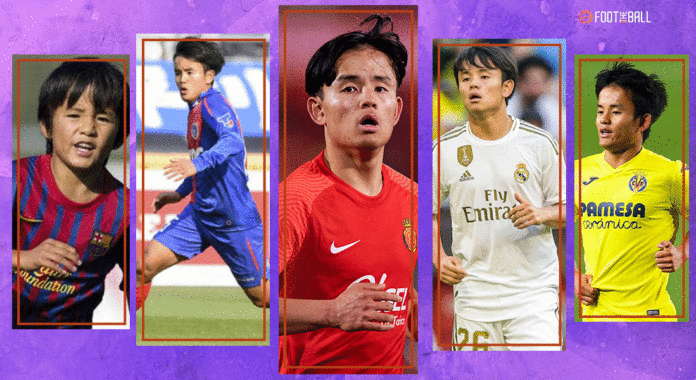Takefusa Kubo was supposed to be the “next Lionel Messi.” Or rather, the “Japanese Messi.” The reality has been neither. As has been the case with all the players earmarked as Messi’s successor, none of them panned out well.
Kubo is a former La Masia star, who joined Real Madrid in 2019 at the age of 18. Three years on and he is yet to make an official appearance for Los Blancos. Therefore, it was no surprise that Madrid Kubo to Real Sociedad for €6.5m.
The top facts you have to know about Aurelien Tchouameni, the next great hope of Madrid’s midfield
However, the reigning La Liga champions still control 50% of his playing rights, which can be sold at a later time.
So, the question remains: how did Takefusa Kubo fall from the highs of La Masia and Real Madrid, to being another youngster struggling for to establish himself in Europe?
A bright start in Japan and Barcelona
Takefusa Kubo’s early career spanned FC Persimmon, Tokyo Verdy, and Kawasaki Frontale from 2008-11. In between, Kubo excelled at the FC Barcelona Soccer Camp, winning MVP honours.
Moreover, he also played for the FC Barcelona School team, again being crowned the MVP in the Sodexo European Rusas Cup. Therefore, it was no surprise that the Catalans invited him for a trial to Camp Nou in 2011. Kubo passed with flying colours and was put into the U11s.
🇯🇵 El nuevo guerrero txuri urdin ⚔
ラ・レアルの新たな戦士#TakeTxuriUrdin | #AurreraReala pic.twitter.com/tYqLNxkXFe
— Real Sociedad Fútbol (@RealSociedad) July 19, 2022
He scored 74 goals in 30 matches in his debut campaign. By then, it was clear that he was a very special player and was promoted to the U14s in 2014.
The record winners of the UEFA Champions League are a cheat code in the competition and here’s how they do it
However, Barcelona were found to have violated FIFA’s rules governing players under 18. Thus, Kubo was barred from playing for the Blaugrana and returned to Japan, joining FC Tokyo.
From Tokyo to Madrid
Takefusa Kubo kept up his marauding ways, playing with the U18s at the age of 15. FC Tokyo promoted him to the reserves in 2016, with Kubo’s J3 League debut in November.
That set the record for the youngest player to appear in any Japanese league at the age of 15 years and five months. It was clear that his first-team bow was coming soon, with Kubo becoming the youngest scorer in history of Japan in April 2017.
His senior debut came just a month later, and Kubo was eventually made a regular member of the squad by the end of the year. Kubo was loaned out to Yokohama F. Marionos in early 2018, before spending the rest of the year and first half of 2019 back at FC Tokyo.
That was when Real Madrid came calling. Long before Florentino Perez’s young Galacticos policy began, Madrid were aiming to get the jump on a future superstar.
32 – Only Adnan Januzaj 🇧🇪 (34) and Sergio Busquets 🇪🇸 (33) created more chances without providing an assist than Takefusa Kubo 🇯🇵 (32) in LaLiga last season. Challenge. pic.twitter.com/j42DMEhOI3
— OptaJose (@OptaJose) July 19, 2022
The expectation was that Kubo would link up with Real Madrid B, but the club decided to loan him out to RCD Mallorca. Kubo played 35 matches, scoring four times.
A second loan spell followed in 2020 to Villarreal, which was cut short in January 2021 after a lack of playing time. However, Kubo immediately joined Getafe, playing 18 games. He was back at Mallorca for the 2021-22 season, featuring 28 times.
Kubo’s struggles was similar to that of Reinier Jesus, another youngster who struggled at Madrid and is out on loan again
According to FBref, he averaged 7.85 progressive carries per 90 and completed 2.02 dribbles per 90. Moreover, he was also astute in blocking shots, averaging 1.79 per 90.
A budding star who needs support
There is no doubt that the constant loan spells have had a detrimental effect in developing his game. The change in manager and system every season cannot be a good sign for a rising star.
Takefusa Kubo is still only 21-years-old and has the very best years ahead of him. Real Sociedad are a solid top-six contender.
Madrid have the successor to Luka Modric in Lovro Majer, who is the next great midfielder from Croatia
Moreover, they are also playing in the Europa League in 2022-23. The European experience will serve Kubo well, and he is raring to go with his words reflecting the same,
“First, I think it’s the most appropriate team for my style as a footballer, and second because of the interest they put in me, I think they were the first. Looking from the outside, I have seen a very young team, with a lot of ambition and desire, and I am very happy to be one more here. Last year as a Japanese I saw two Japanese win the Europa League and, since we have the opportunity to try, why not?”
The career track of a football can never be accurately ascertained, especially in these uncertain times. There will be chances for Kubo to star for a European giant soon.
However, he now has to focus on getting back to his best form, especially with a FIFA World Cup looming. Japan are a continental powerhouse, and have several upcoming stars. Kubo will hope that this beginning is the sign of greater things to come.
Feature image credits: football-espana




